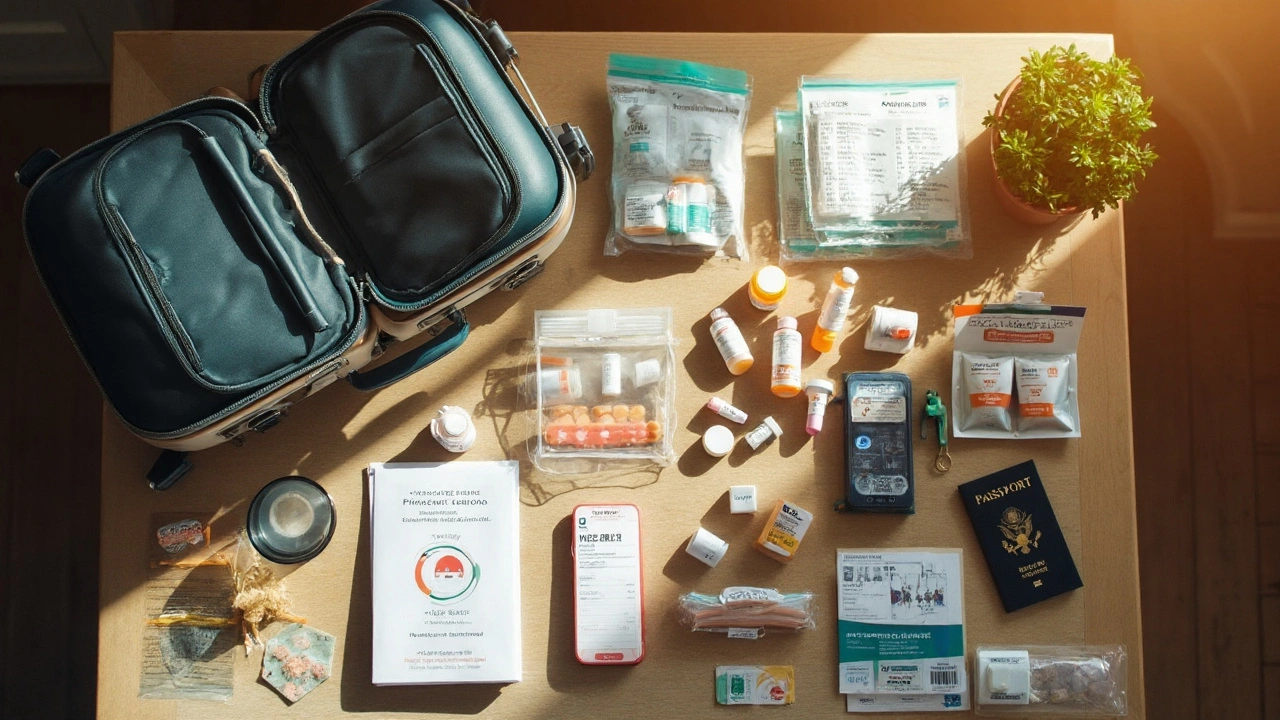Pharmacy Tips for Travelers: How to Keep Your Meds Safe and Effective
Traveling is exciting, but forgetting about your medication can ruin the whole trip. Below are the most useful pharmacy tips for travelers that you can put into action right now.
Plan Your Meds Before You Leave
Start by making a list of every prescription, over‑the‑counter (OTC) drug, and supplement you take. Write down the generic name, dosage, and why you need it. This list helps you when you talk to a pharmacist abroad or if you lose a bottle.
Ask your doctor for a short prescription or a doctor’s note that explains your condition and the meds you need. Some countries require a signed note in English (or the local language) to let you bring controlled substances through customs.
Buy a few extra days’ worth of each drug before you go. If you run out mid‑trip, you’ll have time to locate a local pharmacy without risking a health setback.
Pack Smart and Stay Organized
Put all your pills in a single, clear, resealable bag or a travel pill organizer. Label each compartment with the drug name and dosing schedule – it makes airport security checks faster and cuts down on confusion on the road.
Keep your meds in your carry‑on, not in checked luggage. Temperature changes, rough handling, and theft are common problems in the cargo hold. A small insulated pouch can protect temperature‑sensitive drugs like insulin.
If you need a cool environment, consider a portable cooler pack that fits in your bag. A quick test: place a temperature‑sensitive bottle in the pack for an hour to see if it stays within the recommended range.
Know the Rules at Your Destination
Every country has its own rules about what you can bring in. Look up the customs regulations for your destination on the official embassy site or a reliable travel forum. Some places ban certain painkillers, while others require a pharmacist’s stamp on your prescription.
When you arrive, locate a reputable pharmacy. In many places the pharmacist is the first point of contact for medication advice, and they often speak English. Ask them to double‑check the spelling of any drug you bring, especially if the label is in a foreign language.
Keep a copy of your medication list and doctor’s note with you at all times. If customs asks to see proof, you’ll be ready and won’t waste time.
Be Careful with OTC Drugs Abroad
OTC drugs that are safe at home can be illegal or unsafe in another country. For example, some antihistamines are prescription‑only overseas, and certain pain relievers contain higher doses of acetaminophen.
When buying OTC, ask the pharmacist what the active ingredients are and how they compare to the brand you use at home. If you can’t find a familiar product, ask for a generic equivalent with the same active ingredient.
Never rely on street vendors or souvenir shops for medication. Counterfeit pills are a real risk, and they can look exactly like the real thing.
What to Do in a Medication Emergency
If you run out of a critical drug, call your doctor’s office right away. Many doctors can fax a new prescription to a local pharmacy or email a copy that you can print abroad.
Know the local emergency number (112 in most of Europe, 911 in the US and Canada) and have a list of nearby hospitals or clinics. Some travel insurance plans cover prescription refills, so keep your insurance card handy.
Finally, stay hydrated, get enough sleep, and avoid alcohol if you’re on medication that can interact badly. A healthy routine reduces the chance of side effects and keeps you feeling good while you explore.
Follow these pharmacy tips for travelers and you’ll spend less time worrying about meds and more time enjoying the sights, sounds, and flavors of your destination.

